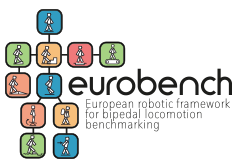- TWO BENCHMARKING FACILITIES, one for wearable robots (including exoskeletons and prostheses) and the other for humanoid robots, to allow companies and/or researchers to perform standardized tests on advanced robotic prototypes in a unique location, saving resources and time.
- A unified BENCHMARKING SOFTWARE, which will allow researchers, developers and end-users worldwide to design and run the tests in their own laboratory settings.
To realize these goals, EUROBENCH will count on the collaboration of external entities, a.k.a. Third Parties, offering them financial support for developing and validate specific sub-components of the Facilities and the Software. This Cascade Funding action, called “FINANCIAL SUPPORT TO THIRD PARTIES” (FSTP) will be organized in two competitive Open Calls:
1st FSTP Open Call: “DEVELOPMENT of the benchmarking framework”. This Call, open from July to September 2018, is looking for Third Parties interested in designing and developing:
- Test bed devices, including ground terrains, perturbation devices, and measurement systems, to allow the testing of a great variety of motor skills.
- Benchmarking metrics and algorithms that allow automatic calculation of performance scores based on recorded data.
- Databases of human and/or robot performance.
2nd FSTP Open Call: “VALIDATION of the benchmarking framework”. This Call, open from June to August 2020, will offer Third Parties the opportunity to use the benchmarking facilities and/or software, at zero-costs, to test and improve their own robotic systems.
For more detailed information, please visit the following sections:

